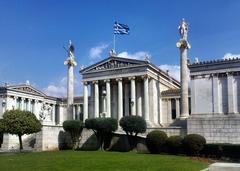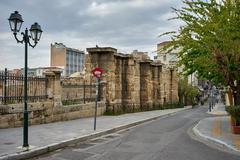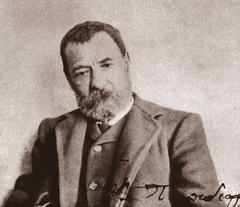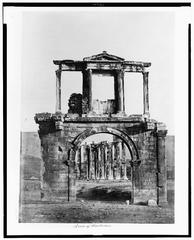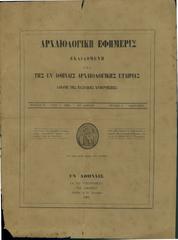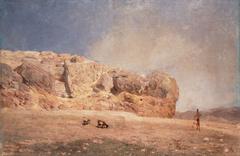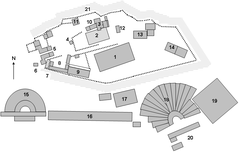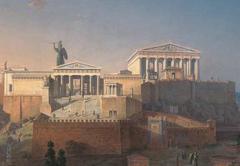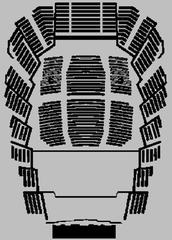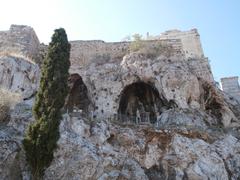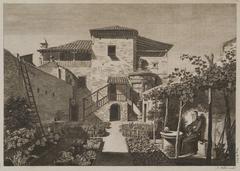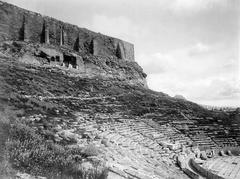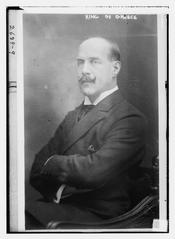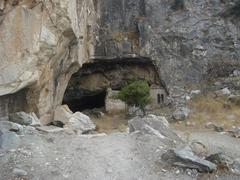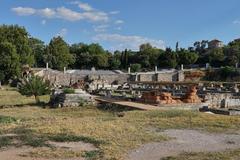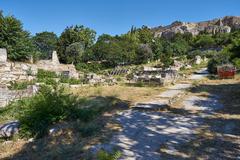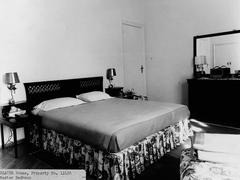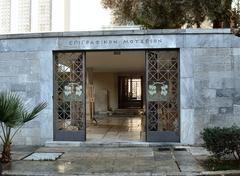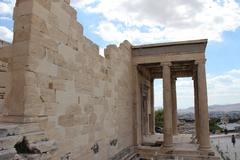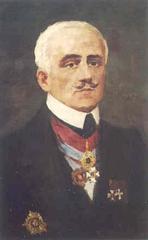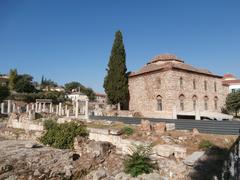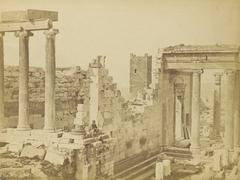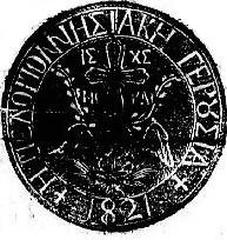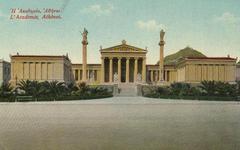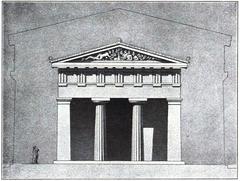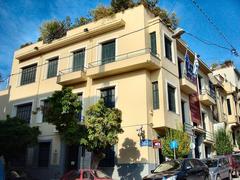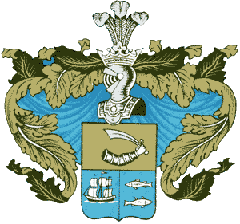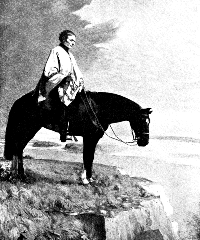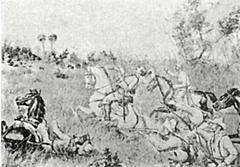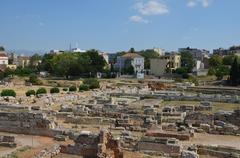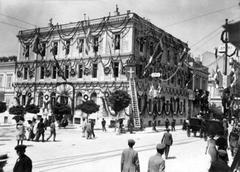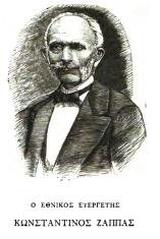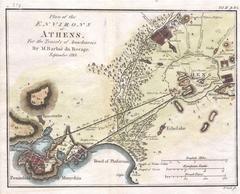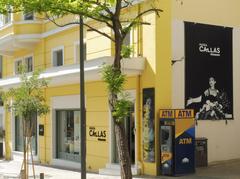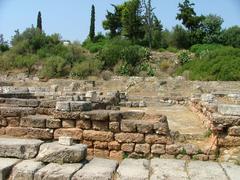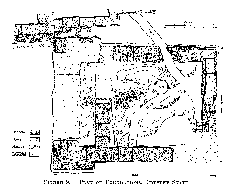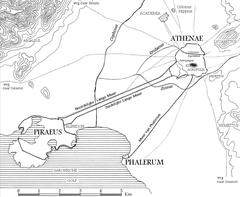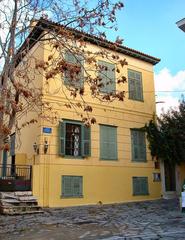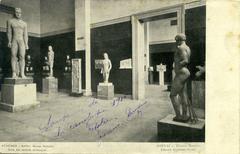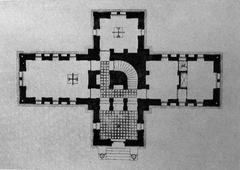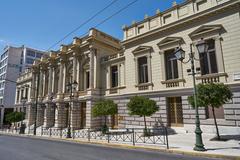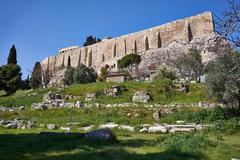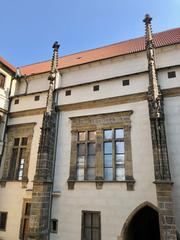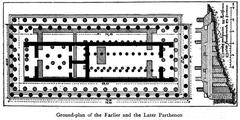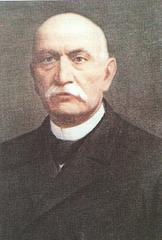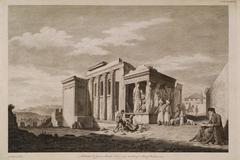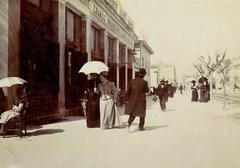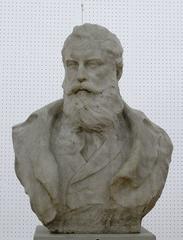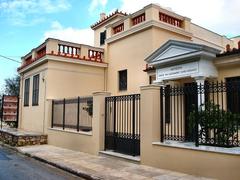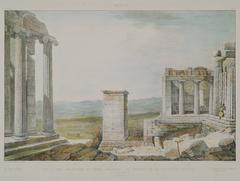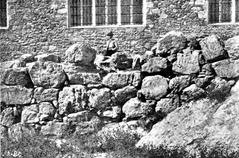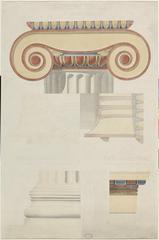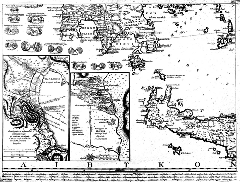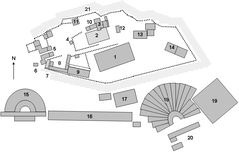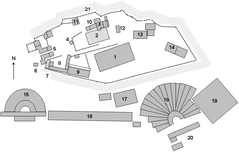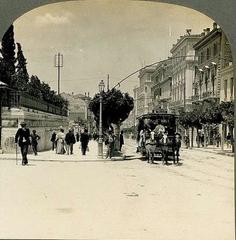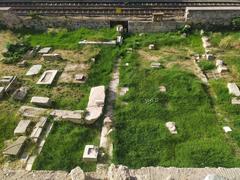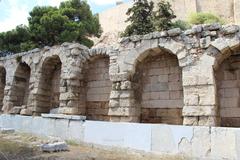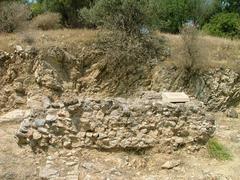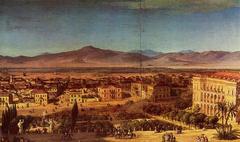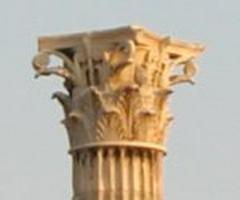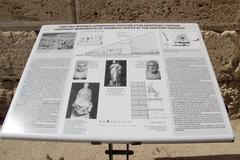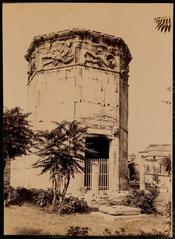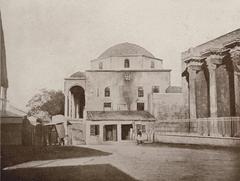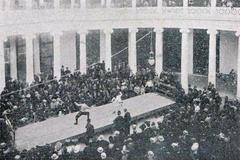Odysseas Elytis Statue Athens: Visiting Hours, Tickets, and Complete Travel Guide
Date: 03/07/2025
Introduction: The Odysseas Elytis Statue and Its Cultural Significance
Athens, a city where ancient heritage meets modern creativity, is home to the Odysseas Elytis Statue—a distinguished tribute to one of Greece’s most renowned poets and Nobel laureates. Situated in the refined Kolonaki district at Plateia Dexamenis, this statue is not just a memorial but a living celebration of Elytis’s poetic legacy, marked by his deep engagement with Greek nature, light, and identity. Accessible to all, the statue is set within a vibrant urban locale, surrounded by museums, cafes, and historical landmarks, making it a compelling stop for literary enthusiasts and cultural explorers alike (Bon Flaneur; This is Athens).
Complementing the statue experience is the Elytis House Museum in the Plaka district, which offers a deeper dive into Elytis’s life through manuscripts, artifacts, and interactive exhibitions. Together, the statue and museum present a comprehensive journey through the poet’s enduring impact on modern Hellenic culture (Elytis House Museum official website; Tovima).
This guide covers everything you need for a meaningful visit: practical details, travel tips, nearby attractions, and insights into the artistic and cultural significance of Elytis’s commemoration in Athens.
Contents
- Introduction
- About Odysseas Elytis
- The Odysseas Elytis Statue: History, Features, and Symbolism
- Visiting Information
- Location & Directions
- Opening Hours
- Admission & Tickets
- Guided Tours & Events
- Accessibility
- Photography & Etiquette
- Elytis House Museum: Visiting, Exhibits, and Events
- Location, Hours, and Tickets
- Accessibility
- Exhibits & Educational Role
- Events & Cultural Activities
- Practical Tips for Visitors
- Best Times to Visit
- What to Bring
- Facilities & Amenities
- Safety & Security
- Transportation & Parking
- Family & Group Visits
- Nearby Attractions
- FAQ
- Visuals & Media
- Legacy & Continuing Relevance
- Conclusion & Recommendations
- Sources
About Odysseas Elytis
Odysseas Elytis (1911–1996), born Odysseas Alepoudelis, is celebrated as a transformative voice in Greek poetry. He is best known for works like The Axion Esti, which merge surrealism with Greek tradition. Awarded the Nobel Prize in Literature in 1979, Elytis’s poetry is marked by a luminous celebration of Greek landscape, history, and the human spirit, making him an enduring symbol of modern Greek identity.
The Odysseas Elytis Statue: History, Features, and Symbolism
Historical Background
The Odysseas Elytis Statue, sculpted by Ioannis Pappas in 1977—two years before Elytis received the Nobel Prize—was officially unveiled in 1997, a year after the poet’s death. Its installation reflects Athens’s commitment to honoring contemporary cultural figures and integrating their memory into the urban landscape (Bon Flaneur; Elytis House Museum).
Artistic Features
Standing 1.68 meters tall, the bronze statue depicts Elytis in everyday attire, with a serene, contemplative expression—a nod to his humility and connection to ordinary Greeks. The limestone pedestal echoes the natural elements central to his poetry. Pappas’s realistic approach invites personal engagement, allowing viewers to connect with Elytis on both a human and artistic level.
Symbolism and Cultural Role
More than a monument, the statue embodies Greece’s literary heritage and Elytis’s vision of Greekness—a balance of tradition and modernity. Located along the Athens Poetry Walk, among other tributes to poets and intellectuals, it anchors literary walks, cultural festivals, and public events, reinforcing Athens’s reputation as a city of intellectual and artistic achievement (Culture is Athens; Scribd Cultural Newsletter).
Visiting Information
Location & Directions
- Address: Plateia Dexamenis, Kolonaki, central Athens.
- How to Get There:
- Metro: Evangelismos (Blue Line), 5-minute walk.
- Bus: Several routes serve Kolonaki; check local schedules.
- On Foot: Close to the National Archaeological Museum and the Benaki Museum.
Opening Hours
- Statue: Open 24/7, year-round; no restrictions.
Admission & Tickets
- Statue: Free; no ticket required.
Guided Tours & Events
- While dedicated tours are rare, many walking tours of Kolonaki and central Athens include the statue. Poetry readings and cultural events occasionally take place nearby, especially on Elytis anniversaries (This is Athens).
Accessibility
- Plateia Dexamenis is generally accessible, with paved surfaces and seating. Some nearby streets are steep, so plan accordingly for mobility needs.
Photography & Etiquette
- Photography is welcome. Visitors often leave flowers or poems at the statue to honor Elytis—please respect the site as a place of cultural memory.
Elytis House Museum: Visiting, Exhibits, and Events
Location, Hours, and Tickets
- Address: 4 Dioskouron St & Polygnotou St, Plaka, Athens 105 55.
- Getting There: 5 minutes from Monastiraki; accessible by Metro (Monastiraki, Thiseio, Acropolis stations) and bus (Museum Visit Info).
- Hours:
- Summer (May–Sept): Thu 12:00–18:00; Fri–Sun 10:30–18:00; closed Mon–Wed.
- Winter (Oct–Apr): Thu–Fri 12:00–17:00; Sat–Sun 10:00–17:00; closed Mon–Wed.
- Closed on major holidays. Last entry 30 minutes before closing.
- Tickets:
- General: €7
- Reduced: €4 (students, seniors 65+)
- Free: Children under 12, people with disabilities and companions, select other categories.
- Check for latest hours and ticket details: Elytis House Museum official website
Accessibility
- The museum is accessible via the entrance at 7 Polygnotou St. Facilities accommodate visitors with disabilities. Guide dogs and assistants are welcome.
Exhibits & Educational Role
- Permanent Collection: Manuscripts, first editions, personal artifacts, photographs, audio-visual material, and artwork inspired by Elytis’s poetry.
- Library & Reading Room: By appointment for research.
- Educational Programs: Interactive displays, workshops, and resources for schools and the public.
Events & Cultural Activities
- Poetry Readings, Lectures, Workshops: Regularly scheduled, often in collaboration with festivals like the Athens Epidaurus Festival (This is Athens).
- Temporary Exhibitions: Explore Elytis’s influence on modern culture.
- Special Festivals: In 2025, the Athens Epidaurus Festival will feature a performance of “Axion Esti” at the Herodeion (Athens Epidaurus Festival 2025).
Practical Tips for Visitors
- Best Times: Spring (April–June) and autumn (Sept–Nov) offer pleasant weather and fewer crowds.
- What to Bring: Comfortable shoes, water, sun protection, camera, notebook for literary inspiration.
- Facilities: Restrooms, gift shop, library, event spaces on-site.
- Safety: Plaka and Kolonaki are safe; follow normal precautions.
- Transport & Parking: Public transport is recommended. Paid parking is limited near Syntagma and Monastiraki.
- Families & Groups: Educational programs available; arrange group tours in advance.
Nearby Attractions
Enhance your visit by exploring:
- Acropolis & Acropolis Museum
- Benaki Museum
- National Archaeological Museum
- Ancient Agora
- Roman Agora & Tower of the Winds
- Anafiotika (Cycladic-style neighborhood under the Acropolis)
- Byzantine and Christian Museum
FAQ
Q: What are the Odysseas Elytis Statue visiting hours?
A: The statue is always open, 24/7.
Q: Is there an admission fee for the statue?
A: No, it is free to visit.
Q: Where is the Elytis House Museum and how do I get there?
A: It’s at 4 Dioskouron St & Polygnotou St, Plaka. Metro (Monastiraki) is closest.
Q: Are guided tours available at the museum?
A: Yes, in Greek and English. Advance booking is advised.
Q: Is the museum accessible for people with disabilities?
A: Yes, accessible entrance and facilities are provided.
Q: Are cultural events held at the museum?
A: Yes, including poetry readings, workshops, and special performances.
Visuals & Media
- Images: Odysseas Elytis Statue (bronze sculpture in Kolonaki); Elytis House Museum (neoclassical exterior); Manuscript exhibits; Poetry readings.
- Map: [Interactive map of Plaka, Kolonaki, and key attractions]
- Virtual tours: Available via museum and tourism websites.
Legacy & Continuing Relevance
The Odysseas Elytis Statue and Elytis House Museum stand as powerful reminders of Greece’s rich literary tradition. Elytis’s poetry, celebrated for its universal themes and luminous imagery, continues to resonate globally. The statue and museum together invite visitors to experience the living legacy of modern Greek culture and the transformative power of the written word (Scribd Cultural Newsletter; Culture is Athens).
Conclusion & Recommendations
Whether you’re a literary pilgrim or a traveler seeking cultural insight, the Odysseas Elytis Statue and House Museum offer a profound journey into the heart of modern Greece. With open access, thoughtful exhibits, and a central location amidst Athens’s historical wonders, these sites are unmissable for anyone interested in Greek poetry, art, or history.
Plan your visit:
- Confirm hours and tickets on the official museum website.
- Download the Audiala app for guided tours and insider tips.
- Follow Athens’s cultural events calendar for poetry readings and special performances.
Sources
- Odysseas Elytis Statue in Athens: Visiting Hours, Tickets & History, Bon Flaneur
- Visiting the Odysseas Elytis Statue in Athens: Hours, Tips, and Cultural Significance, This is Athens
- Odysseas Elytis Statue and House Museum in Athens: Visiting Hours, Tickets, and Nearby Attractions, Tovima
- Elytis House Museum Visiting Hours, Tickets & Cultural Events in Athens, Elytis House Museum Official Website
- Greek Poet Odysseas Elytis New Museum, Greek Reporter
- Cultural Newsletter Odysseus Elytis, Scribd
- Athens Travel Guide, Go Ask a Local
- Athens Tourist Guide
- Athens Epidaurus Festival 2025, This is Athens
- Culture is Athens: Athens Poetry Walk
